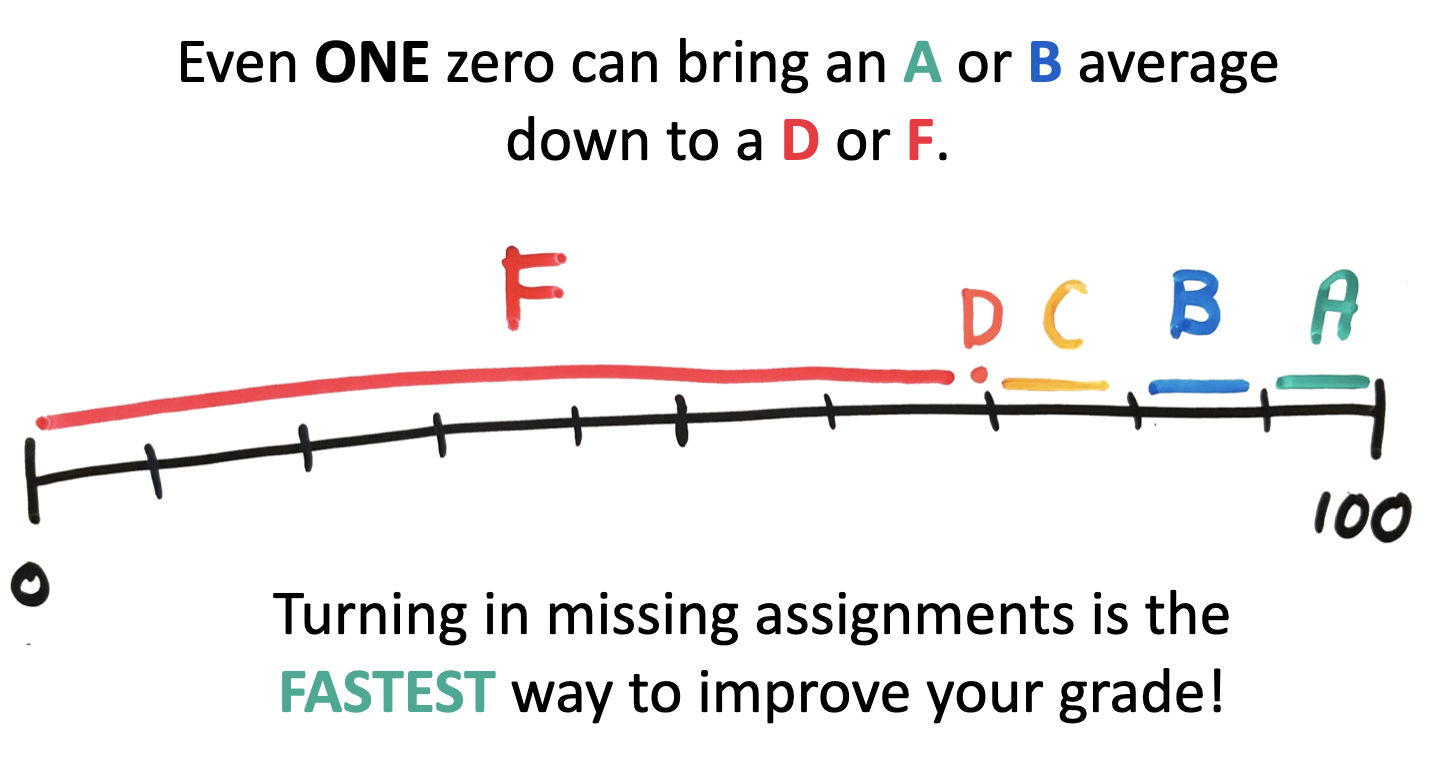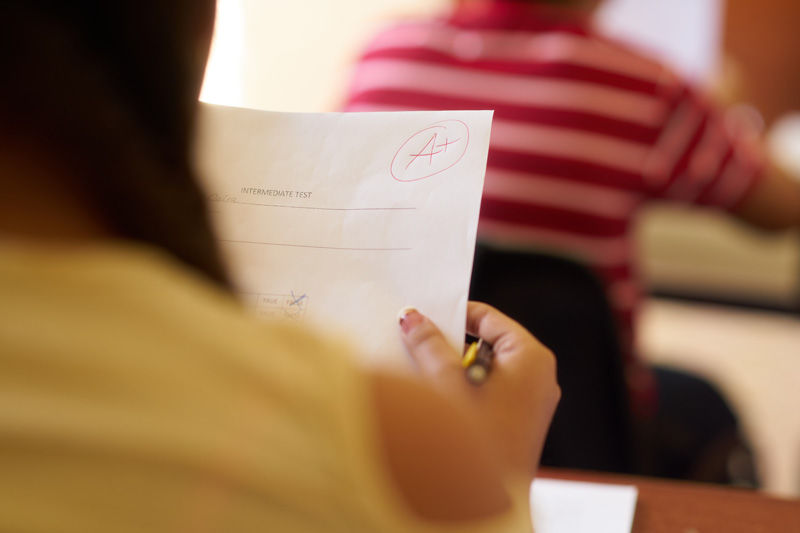Students’ grades are the most important factor colleges consider when making admissions decisions.
So, with the end of the semester approaching, how can you make sure your student is finishing the semester with the best grades they can?
At this point in the semester, there are two main areas students can focus on to help improve their GPA…
- Maximizing their current grades, or
- Improving their exam grades
While exams can help, relying on them to “save” your grades at the end of the semester is a risky strategy. Even with the best study plans, exams can be difficult…especially if they are testing students on everything they’ve learned since the beginning of the semester.
So, we always recommend students start by bringing up their current grades as much as possible so they’re less dependent on exams going perfectly.
Here are the 5 most important steps students can take to improve their grades before the end of the semester
Step 1: Check current grades
The first step in improving grades is to find out exactly what they are right now. Depending on your student’s school, this could take just a few minutes to quickly check their grade portal, or it might require reaching out to their teachers to see where they stand.
Either way, this can be a stressful process – especially if your student isn’t happy with how they’re doing.
So, encourage them to take a non-judgemental approach and remember that it’s OK if their grades aren’t where they want them to be YET…that’s why we’re checking now, while they still have time to improve things before the semester ends.
Step 2: Make up missing work
The fastest way for students to improve their grades is by turning in any missing assignments they are still allowed to submit. Because of the way the grading scale is weighted, missing work can have an enormous impact on students’ grades…

If grades are posted online, missing assignments should be relatively easy to find by pulling up their online grade portal and making a list of any work that is listed as 0%, 0/100, “Missing”, “incomplete”, or “NHI” (“not handed in”). Some schools and teachers have shifted to a grading policy of giving students a 50% for any missing assignments, so assignments listed with a grade of 50% may be missing as well.
Students who just have one or two missing assignments may be able to easily find and make them up in couple of days. If they have a lot of missing work, it could take much longer – especially if they need to follow up with teachers to find out what they’re still allowed to submit and get access to instructions or and/or resources they need to complete the work. So, it’s a good idea to start this step as soon as possible.
For more information about this process, you can check out our recent blog post on why students struggle to turn in missing work and how to help them get unstuck.
Step 3: Address any low scores on tests & quizzes
If students have any low test or quiz grades from earlier in the semester, they can check with their teachers to find out if there is an opportunity available to make up, retake, recover, or do test corrections for any of them. This may not be an option, but it is always worthwhile to ask! Tests and quizzes are typically worth much more than assignments, so even just improving one low test score can make an enormous difference.
Even if past tests or quizzes can’t be made up for a grade, it’s still a good idea for students to go over any mistakes they made on those assessments to make sure they know which questions they got wrong (and why!) before their end-of-semester exams.
Step 4: Pursue any extra credit opportunities
Especially if there are several students who need to improve their grades, teachers will often give out extra credit assignments toward the end of the semester that students can complete to improve their final grade in the class.
Students sometimes resist the idea of asking for extra credit opportunities because they’re worried it will upset their teacher, but if they approach the conversation the right way this can actually demonstrate their work ethic and willingness to go above and beyond.
Even if teachers don’t have any extra credit to offer, they may be willing to help students out in other ways if they know that they really care about the class and are trying their best to improve.
Step 5: Maximize any remaining grades
Even if there is no way to turn in missing work, recover old tests or quizzes, or do extra credit assignments, students can still improve their current grades by doing as well as possible on any remaining work they have assigned before the end of the semester. There are often major projects, presentations, unit tests, and/or papers due in the last few weeks of the semester, so doing well on these remaining assessments can have a significant positive impact on their overall grades.
Attending office hours or scheduling a 1:1 meeting with teachers is a great way to get advice about how to approach any remaining coursework as effectively as possible, but if this is not an option then emailing them with questions can work as well. Either way, it is a good idea to be proactive with reaching out to the teachers for guidance about these end-of-semester assignments since there may not be time left after they’re submitted to correct any mistakes after the fact.
Next Steps
Depending on what your student has planned for their upcoming Thanksgiving break, this can be a great time for them to to check on their current grades and start taking any necessary steps to improve.
The end of the semester can be a stressful time for students and their families, especially if your student’s grades aren’t where they need to be. If you have any questions about how to help your student improve their performance at school, please feel free to email me at maggie@creatingpositivefutures.com or set up a time to connect on our website here and we’ll be happy to help.

Join 11,000+ parents helping their students earn better grades with less stress!

About The Author
Dr. Maggie Wray is a certified ADHD Coach & Academic Life Coach with a Ph.D. in Neurobiology and Behavior from Cornell and a Bachelor’s degree in Astrophysics from Princeton. She founded Creating Positive Futures in 2012 to help high school and college students learn how to earn better grades with less stress. Her team of dedicated coaches is on a mission to empower students to develop the mindset, organization, time management, and study skills they need to achieve their goals.
Related Posts
Other Posts You May Enjoy
Preparing for exams: 4 steps to success
As we get closer to exams, students are getting increasingly stressed out. And when teens are stressed about their exams, it can affect everyone else around them, too! Following the four-step planning process below can help students prepare more effectively for their...
Why it’s hard for students to “just turn in” missing assignments, and how to get them unstuck
With the end of the semester on the horizon, many students may feel overwhelmed by low grades or feeling behind in some of their classes. As a parent, it can be stressful to see that your student has overdue work, or get notifications from their teacher that they’re...
Why the most common study method is the least effective…and what to do instead
Re-reading class notes and/or textbooks is one of the most common methods students use to study for exams. Unfortunately, research also shows that this is one of the least effective study methods for improving students’ performance on exams (Dunloski, 2013)....




